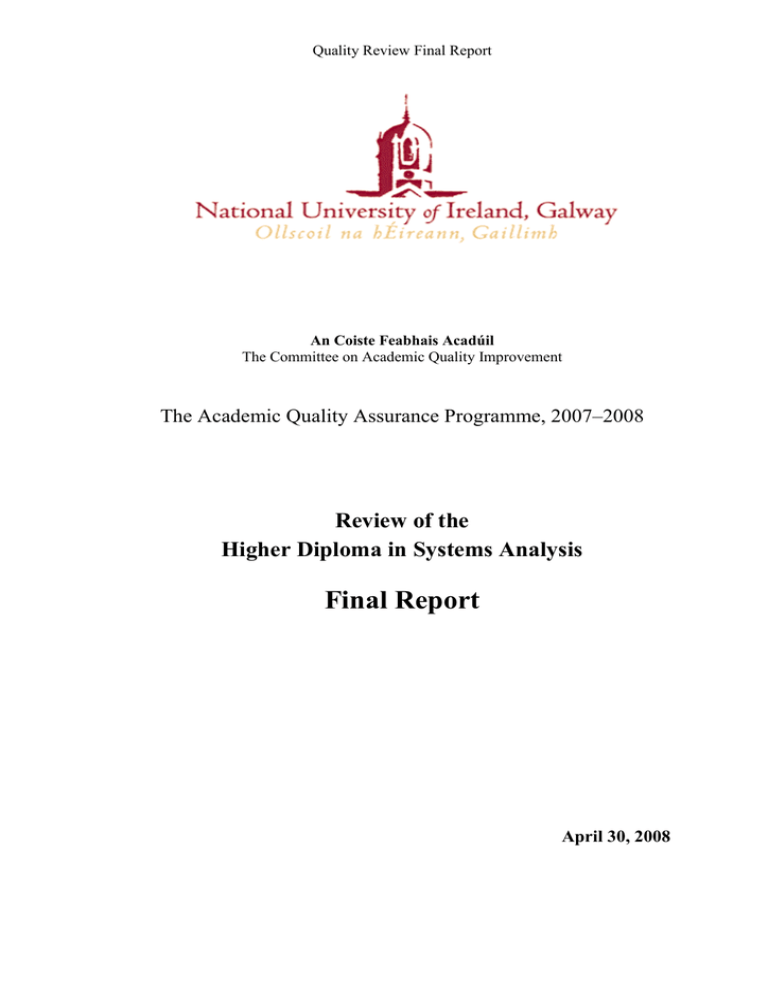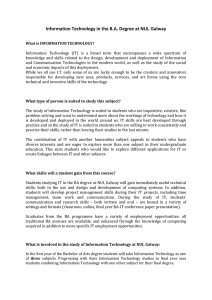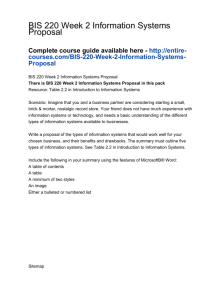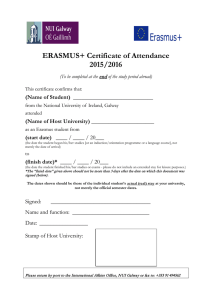Final Report Review of the Higher Diploma in Systems Analysis
advertisement

Quality Review Final Report An Coiste Feabhais Acadúil The Committee on Academic Quality Improvement The Academic Quality Assurance Programme, 2007–2008 Review of the Higher Diploma in Systems Analysis Final Report April 30, 2008 Quality Review Final Report: Higher Diploma in Systems Analysis This review of the Higher Diploma in Systems Analysis is based on the visit of a review group during January 28th and 29th, 2008. The Business Information Systems (BIS) group had prepared and submitted a self-assessment report that along with associated documentation was available to the group in advance of their visit. The members of the review group were Dr. Roger Blake of the Department of Management Science and Information Systems at the University of Massachusetts, Boston as Chair, Dr. Chris Coughlan of Hewlett-Packard, Ms Mary Dempsey of the Department of Industrial Engineering at NUI Galway as Cognate, Mr. Sean Duignan of the Department of Maths & Computing at the Galway-Mayo Institute of Technology, and Dr. Dagmar Stengel of the Department of Botany at NUI Galway as Rapporteur. The organization of this report follows the topics and sequence suggested in the Academic Quality Assurance Programme guidelines of 2007-2008. 1. Aims and Objectives 1.1 Appropriateness and clarity The Higher Diploma of Systems Analysis (here used synonymously with the term Programme) is aligned with many of the strategic priorities outlined in NUI Galway’s 2003-2008 strategic plan. This is particularly so for the priority to attract nontraditional students such as part-time students or life-long learners (Strategic Priority 1.6), the priority to improve student focus (Strategic Priority 1.3), and the priority for fostering opportunities for economic and industrial development (Strategic Priority 4.1). The Programme is a fit with the general aims of the Faculty of Commerce and appropriate as a programme held within the Cairnes Graduate School. The Faculty of Commerce and the University is currently embarking upon a restructuring effort, and the Faculty of Commerce is in the process of formulating strategic objectives. Notwithstanding the lack of Faculty-wide objectives, there do not appear to be clearly defined objectives for the direction of the Programme itself. Since its start, as is so important for any Information and Communications Technology (ICT) programme, the Business Information Systems (BIS) group within the Department of Accountancy and Finance has continued to update the Programme’s curriculum over time. It now includes a range of topics such as software engineering, database management, programming, and web and systems design. With a broadening curriculum, the learning objectives for the Programme need clear articulation. From clear objectives, specific learning outcomes need to be developed for each course which, while possibly stated informally, are generally not comprehensively expressed in course syllabi at the moment. Only two of the twelve required courses are ‘Systems Analysis’ in the traditional sense, taught using ‘classic’ Systems Analysis texts. From an overview of the curriculum, an emphasis on Systems Analysis is not immediately apparent, possibly one indication of the need to re-position the Programme. 1 As concluded in the BIS Group’s Self-Assessment Report, the Higher Diploma in Systems Analysis is at a juncture point. At the current time a Higher Diploma does not have the same international recognition as a Master’s Degree. Since the inception of the Higher Diploma in Systems Analysis, over 100 competitive programs have sprung up, some offering a Master’s Degree in as little as 12 months compared with the 9 month Diploma. In recent years, enrolments in the Programme have declined and parttime students from outside NUI Galway now comprise the majority. This is in no way a disparagement of the Programme or the BIS group; they have been very successful in delivering the Programme and incorporating new technologies into its curriculum since its inception. Students and graduates expressed satisfaction with both. Industry recognizes the value of the Programme. Other groups within NUI Galway have expressed a willingness to collaborate. These are among several significant positive assets and potential resources that the Programme has. 1.2 Operational plan The Programme’s operational plan in the Internal Assessment Report outlines the main duties and responsibilities of the Programme Director and interactions of the Director with members of the BIS Programme board. The duties and responsibilities are appropriate, but a plan for more direct industry interaction should be developed and implemented as noted later. 2. Organization and Management 2.1 System of management The Programme is very well organised and enjoys a good internal and external reputation primarily due to the dedication and enthusiasm of its teaching staff, who are also engaged in a range of cross-discipline and college interactions. The Programme benefits from the experience of a consistent long-term involvement of staff and changes instituted by the BIS group since the Diploma’s start in 1979. The foresight of the staff to develop and refine it over the years is recognized, and the review group is confident that the record of continuous foresight will continue. The formal management role of a 3-year rotation appointment of a Programme Director is a very positive mechanism that adds value to the Programme. 2.2 General duties and responsibilities Programme management is a sizeable administrative task taken on in addition to research and teaching activities. This should have formal recognition through the addition of administrative help at least on a shared basis. It is also in need of professional marketing assistance that is capable of evaluating the Programme’s potential market and developing and tracking promotional activities to pursue that market. This too could be on a shared basis with other BIS Programmes. 2 2.3 Participation The staff’s collegiality and willingness to collaborate is an important asset that can help ensure the Programme has continued success. 2.4 Student feedback Students felt that generic skills are well taught and that the Programme content helps to develop a set of skills and knowledge that can be used immediately in employment. This was supported by evidence from graduates who felt they were well equipped with relevant skills for the workplace. Multiple mechanisms for formal and informal feedback and staff-student relations are in place. The BIS group is very committed to responding to the level of service expected by both traditional and non-traditional students. The students met by the review group expressed a high degree of satisfaction with their ability to communicate feedback to the staff and to have that feedback heard by them. Although the minutes of the staff-student committee meetings were not in evidence, the Self-assessment Report notes that these meetings did take place; students were well aware of the committee. There was an indication that while students considered teamwork useful, the composition and choice of groups for coursework may need more careful consideration. Students felt the proportion of marks given to some group work was imbalanced to the high side. The hands-on application in labs of the concepts learned during lectures is an essential factor for successful ICT learning. Far from being optional reviews or recitations, labs are an integral part of the learning process. The term ‘tutorial’ has many different connotations and to differentiate them from those other meanings and emphasize their distinction, renaming them to ‘labs’, ‘laboratories’ or ‘practicals’ should be considered. Potentially more troublesome, students indicated a perceived disconnect between the quality of the lectures and the quality of the labs/practicals. Postgraduates are typically involved in these labs/practical whereas BIS group staff are not. Students indicated the degree of continuity between lectures and lab/practicals could be problematic based on particular postgraduate lab assignments. 3. Programmes and Instruction 3.1 Focus There is a current shortage of good and relevant ICT training in Ireland. The Programme can address this need; interviews with students and graduates affirmed its relevance. However, to maintain and enhance this relevance, closer ties to industry need to be forged. These should include more regular feedback from an industry board; membership in professional groups and participation in the Information Technology 3 Association Galway (ITAG) should be considered. FÁS funding should be explored; with the prospect that industry would be more likely to encourage employees to take the course if it is appropriately subsidised. 3.2 Teaching and curriculum The review group met with currently enrolled students and recent graduates. The calibre of both was impressive; members of each group had achieved or were pursuing Level 10 awards. Students appeared engaged with the Programme and its learning objectives and graduates expressed satisfaction with it. They had little difficulty identifying particular modules they found most interesting to them and/or useful in their careers. Nonetheless, learning outcomes and objectives for both the overall Programme and the modules need to be clearly stated. Many course outlines express only general learning objectives. The learning outcomes need to be explicitly enumerated for each course and each tied to the Programme’s overall objectives. Learning outcomes should be developed in coordination with industry and with regard to developing the Programme’s unique selling points. One potential unique selling point (USP) for the Programme includes time tabling and a course organisation that accommodates both part-time and full time students. This USP provides highly desirable flexibility for family, life/work balance and studying. This is an important feature of the Programme and is appealing to prospective students. Given that practical components (tutorials/labs) are at the centre of delivery and students have identified a potential disconnect, labs should be accorded the appropriate staff levels. The recruitment of postgraduates should not be a limiting factor given the staff numbers, and postgraduate tutors need to be appropriately qualified and trained in delivery. For this, postgraduate training is available through the Centre for Excellence in Learning and Teaching at NUI Galway (CELT). The self-assessment report proposed the implementation of blended learning components, a possibility also mentioned by some staff. Blended learning as a secondary support system reflects a general trend in postgraduate teaching and would be supported by NUI Galway administration and management. The review group recommends caution and a careful consideration of the required efforts and necessary tradeoffs. Students did not recommend a move away from “face to face” learning and the “friends for life” culture, consistent with findings at other universities. E-learning often serves best as a supportive tool, as is already being utilized through Blackboard and supported by CELT. The Programme should be reviewed comprehensively internally (on an informal basis) every 2-3 years and take on board feedback from students and employers, and graduates surveyed frequently. Our understanding is that the most recent survey of graduates was in summer 2006. 4 3.3 Student assessments The marks and standards were included in the self-assessment report and appear to be quite clear. As concluded in the External Examiner’s report, we find exams to be fair, impartial, and well tied to course material. We also agree with the External Examiner’s report, which encouraged a reduced emphasis on exams in favour of more project work as was the case earlier in the Programme’s history. There is a potential source of project work from the establishment and renewal of links to other faculties. These interdisciplinary projects would benefit students in their careers and are encouraged. Project work is particularly appropriate given the applied nature of most aspects of this course. Project-based assessment may have required a great deal of faculty resources during the period of peak enrolments. With the lower numbers now enrolled and projected for the near future, this form of assessment might be more realistic. The methods of assessment for practical work need alignment with specific objectives of each course and particularly with the more general learning objectives of the Programme. Considering options for assessment relates to NUI Galway’s Strategic Priority 1.7, reviewing the examination system. From the perspective of students interviewed by the review group, the proportion of marks allocated to teamwork is too high. Some students felt their group assignments had penalized them when paired with weaker students. 3.4 Special needs Special needs are catered for and this became evident from examples given during our interviews. The staff was aware of these needs and the support services that NUI Galway has to offer. Students felt that staff was accessible. In particular, students felt that the staff’s opendoor policy fosters a climate of open communication and a willingness to hear informal student feedback. 4. Scholarship and Research 4.1 Culture of research CVs of teaching staff suggest that members are research active and free to pursue academic research and supervise research students. 4.2 Pursuit of research Recent funding such as CISC is impressive, as is the involvement of the staff in bringing prestigious international conferences to NUI Galway. These include bringing the Information Systems Development (ISD) conference to NUI Galway in 2007, and hosting the upcoming 16th European Conference on Information Systems (ECIS) in June 2008. Both increase the University’s standing and directly relate to NUI Galway’s Strategic Priority 2. They are accomplishments of which the BIS group should be proud. 5 4.3 Research support of programmes Ongoing staff publications in journals and conference proceedings are encouraging and promote research-led teaching. They also represent opportunities for appropriate research projects should a new Master’s Degree be added in the future. 5. Community Service The Higher DSA Programme embodies the philosophy of life-long learning. It is capable of serving the developing needs of the region now and in the future, an aim outlined in NUI Galway’s strategic plan. The Programme supports and meets the needs of local industry and thus can continue to provide a relevant value-add service for the local business community. The Programme should seek to align itself with the University’s Community Knowledge Initiative (CKI). This may come through collaborations with other areas of the University on community enriching IS / IT projects. The review group was very encouraged by the good relations between the BIS group staff and other Faculties within NUI Galway, and with their involvement in interdisciplinary programs. The review group believes these will accrue significant benefits to the department in the future. 6. The Wider Context Over the next year, the Faculty of Commerce plans to seek the EQUIS accreditation offered by European Foundation for Management Development (EFMD). The criteria for EQUIS accreditation includes a balance between academic quality and professional relevance, with relevance defined by a “strong interface” with industry. By these criteria, the Higher Diploma in Systems Analysis could become an asset for accreditation. Some staff members expressed a sense that the balance sought by EQUIS may tip towards increasing the number of PhDs and towards valuing research activities over teaching and administration. 7. Summary The BIS Group has successfully managed the Higher Diploma in Systems Analysis for almost 30 years, covering several generations of technological change, and is appropriately considering the Programme’s direction. The BIS Group has kept the curriculum current, although in the process it has broadened. Formulating overall objectives for the programme and learning outcomes for each course will help redefine the curriculum’s direction. It will also help articulate the unique selling points the Programme has to offer, its competitive advantage, the type of students it wishes to attract, and by what means the Programme can continue to evolve to meet the needs of industry. 6 The review group consistently heard that the skills taught in the Programme’s curriculum were in demand by industry. We also heard that local industry believes in the value of the Programme and expresses willingness to help shape it, which should be formally pursued. Both current students and recent graduates expressed satisfaction with the Programme and the curriculum. They were particularly satisfied with the BIS Group staff and its willingness to hear feedback. As constructive criticism, they asked for more staff supervision and involvement in coordinating content between lecture and lab. As did the external examiner and this review group, students viewed project work to be more beneficial than exams especially for several specific topics and courses. The review group concurs with the view of BIS Group staff that the level 8 degree should be retained and a taught level 9 degree developed with appropriate additional content to warrant the award. There are many options to be considered for a new level 9 degree, such as a nine-month level 8 program to be followed by a 3 month research component. The review group is not in a position to make specific recommendations for how a new level 9 degree programme should be structured or the relationship it may have to the existing level 8 Diploma. The review group is confident that the BIS group is well prepared and well aware of the complexities they face in order to determine the best path for the Higher Diploma in Systems Analysis, and wish them well in their efforts. 8. Recommendations The following is a summary of the recommendations offered by the review group. a) Programme Structure - Reassessment The Programme’s direction, overall objectives, and position as a Higher Diploma or Masters Level need reassessment. The review group concurs with the BIS Group and recommends the retention of the level 8 degree and the development of a taught level 9 degree with appropriate additional content to warrant the award, although as noted above the review group is not in a position recommend among specific options. A prospective restructuring of the Programme needs to consider Unique Selling Points (USPs), its position and support within the Cairnes Graduate School, and alignment with the School’s and Faculty’s objectives. b) Programme Position – Closer to Industry Although skills taught in the Programme are in demand by industry, closer links need to be forged with relevant industries. A formal process of regular curriculum and course content review and revision should be instituted and reflect industry needs by incorporating regular feedback from employers and graduates. Industry support with Academic Alliances, advertising, and additional funding opportunities should be explored. 7 c) Programme Learning Objectives - Reformulation The BIS Group has kept the curriculum current, although over time the content and learning objectives have broadened. The Programmes’ learning objectives need reformulation in concert with industry involvement. The overall objectives of the Programme and learning outcomes for individual modules should be identified and formulated. Curriculum changes should be made to match current industry needs, facilitate generic and specific competencies, and could be developed in liaison with the University’s Community Knowledge Initiative (CKI). d) Programme Delivery – Better linkage of lecture and lab The organisation of teaching in the laboratory/practical sessions should be formalised and the materials covered in those sessions better integrated into overall course structure. The laboratory/practical sessions should be more closely supervised and possibly taught by academic teaching staff. CELT training for postgraduate teachers should be explored. e) Student Evaluation – Increased project work A reduction in emphasis on exams in favour of more project work should be made, as recommended by the External Examiner and as was the case earlier in the Programme. Project work can arise from the increased industry involvement for curriculum development and from the establishment and renewal of links to other faculties. The assessment methods of group project work (e.g. percentage of marks given) and the methods used for project and group assignments should be reviewed to ensure fair assessment procedures. 9. Comments on the Methodology of the Review Process The scope, structure, and organization of the review process were excellent, and the willingness of the BIS staff and others within the University to participate in the process and collaborate was impressive. Faculty at other universities have seen these activities occur only on an “as-needed” basis, and appreciate the value of this exercise. The members of the review group wish to thank the Quality Office for their gracious hospitality, wished to express appreciation for the well-organized guidance in conducting the review. We are also appreciative of the Business Information Systems staff for openly sharing their issues and concerns with us. We hope this review document will be of use to them as they continue to evolve the Higher Diploma in Systems Analysis. Dr. Roger Blake (Chair) Dr. Chris Coughlan Ms Mary Dempsey (Cognate) Mr. Sean Duignan Dr. Dagmar Stengel (Rapporteur) April 30, 2008 8



